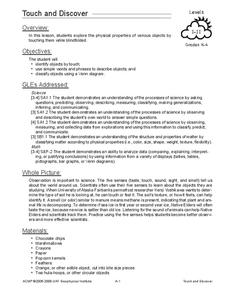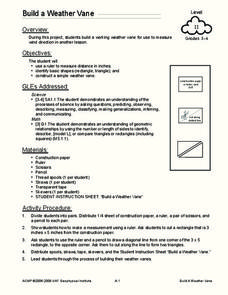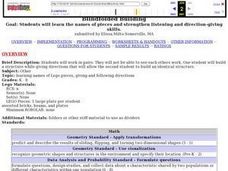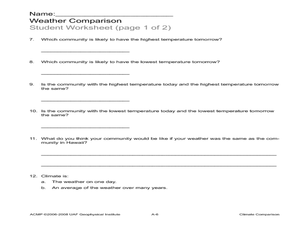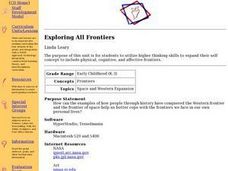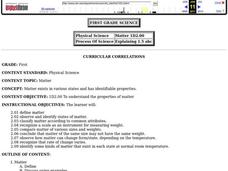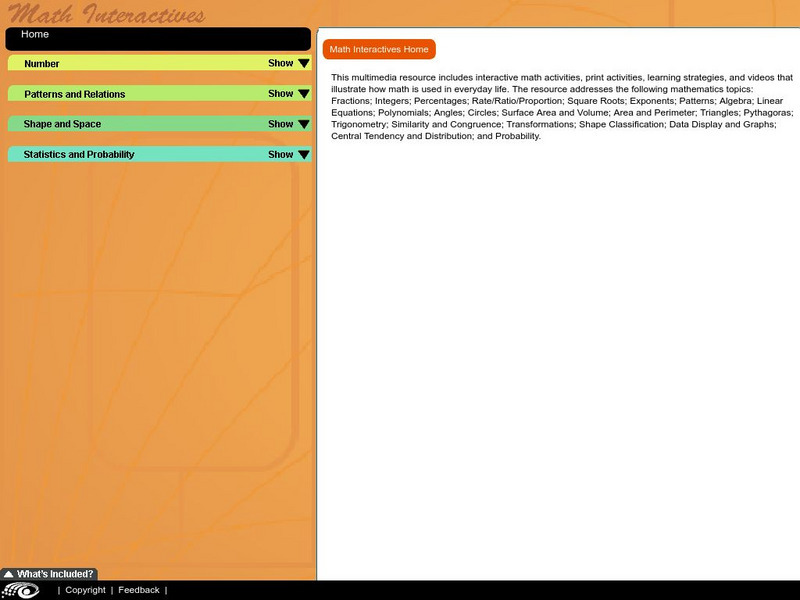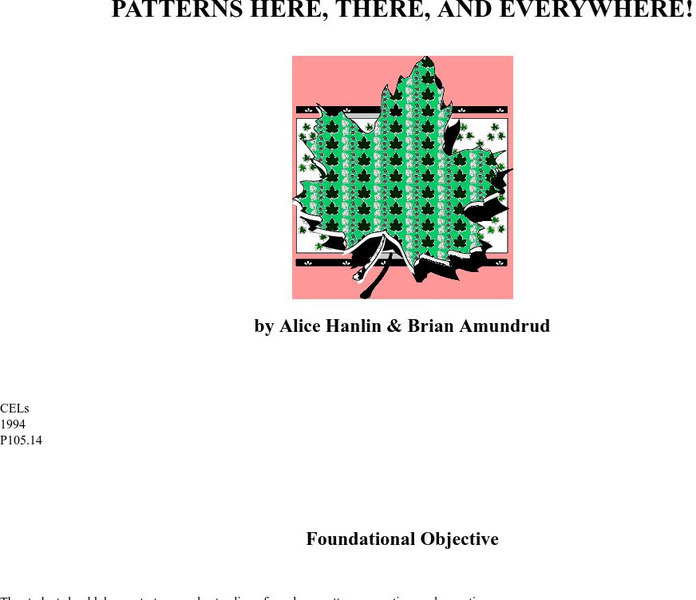Curated OER
Houses
Third graders use a number of problem solving strategies in this unit of lessons. They determine how to draw and model three-dimensional objects, use co-ordinate systems, determine probability of events, and identify paths of simple...
K12 Reader
What Is a Glyph?
After reading a short passage about glyphs, kids must follow the provided directions to create a star glyph.
Curated OER
Rename Fruits, Vegetables and Spices
Students explore fruits and vegetables. In this fruits and vegetables lesson, students study traits of various fruits, vegetables and seeds. Students rename fruits, vegetables and seeds.
Curated OER
Soil Stories
Tenth graders collect and analyze soil samples and extrapolate the characteristics needed to support different types of plant life. They research different types of prairie soil and how it supports plant and animal life.
Curated OER
Touch and Discover
Students identify the physical properties of items using the sense of touch. For this touch and discover lesson, students describe items. Students sort items using a Venn diagram.
Curated OER
Take an Ant to Lunch
Second graders construct a model of an ant, exemplifying that ants are insects. Students gather data create a pictograph chart to show ant food preferences. Also, 2nd graders access the Internet to explore ant eating habits.
Curated OER
Life Cycle: Diversity in a Balance 4th Grade Workbook
In this life cycle workbook, 5th graders examine plant and animal cells, classification of organisms, human biology, photosynthesis, and natural environments. 21 different activities make up the Life Cycle Workbook.
Curated OER
Roman Archy
Third graders use Google Earth to examine Roman architecture. In this ancient Rome lesson, 3rd graders visit the noted URLs to look at examples of Roman architecture. Students work in teams to examine data about the structures.
Curated OER
"I Have a Dream"
Young scholars examine the role Martin Luther King Jr. played in America's history and what life was like in the 1960's. They watch and discuss an online video about the childhood of Martin Luther King, Jr. and the holiday enacted in...
Curated OER
Build a Weather Vane
Third graders measure wind direction. For this weather lesson, 3rd graders build a weather vane from a straw, skewer, spool, and flag. Students measure wind direction using their weather vane.
Curated OER
Sea Ice: Unscrambling the Egg Code
Students determine sea ice thickness, concentration, and floe size by reading egg codes. In this sea ice conditions lesson, students color code a map based on prescribed criteria and use the maps to identify changes in sea ice...
Curated OER
Blindfolded Building
Students build a Lego design and then work with a partner to reproduce that design. They guide the building of the reproduction by description only and then check their work.
Curated OER
Climate Comparison
Students explore climate regions. In this climate lesson, students examine the climate regions of Alaska as well as the state of Hawaii. Students research selected Internet sources to gather information regarding the climates present in...
Curated OER
Exploring All Frontiers
Students utilize higher thinking skills to expand their self concept to include physical, cognitive, and affective frontiers. The teacher create activities which allow students to use raw data and primary sources, as well as...
Curated OER
Marshland Wonders
Students review the characteristics of wetlands and list their benefits. After viewing short videos, they identify the organims that make their home in wetlands and how they have adapted. They compare and contrast the characteristics...
Curated OER
Matter
First graders study and define matter. They observe and identify states of matter along with common attributes and study how matter can change form or change its state depending on temperature.
Curated OER
Bat's a Fact
Second graders investigate the truths and misconceptions associated with bats. By illustrating the characteristics and uniqueness of these often feared and misunderstood creatures, 2nd graders increase their awareness of these nocturnal...
Khan Academy
Khan Academy: Classify Shapes by Line and Angle Types
Classify shapes based on pictures or attributes, such as angle types and side-lengths. Students receive immediate feedback and have the opportunity to try questions repeatedly, watch a video or receive hints.
Khan Academy
Khan Academy: Classifying Shapes by Line and Angle Types
In this exercise, students practice classifying shapes by line and angle types. Students receive immediate feedback and have the opportunity to get hints and try questions repeatedly.
Government of Alberta
Learn Alberta: Math Interactives: Classifying Quadrilaterals
This multimedia that includes a short video [1:19] and other interactive activities on Learn Alberta math resource looks at real-world examples of shape classification in the investigation and solving of crimes. The accompanying...
Government of Alberta
Learn Alberta: Math Interactives: Exploring Shape Classification
Investigate the properties of triangles, quadrilaterals, and regular polygons using this interactive Learn Alberta math resource. Students are able to practice classifying shapes based on their different properties. Be sure to follow the...
Khan Academy
Khan Academy: Practice: Classify Shapes by Line and Angle Types
Look at the properties of 2D shapes to see which shapes can belong to the same group. Includes hints.
US Department of Education
Helping Your Child Learn Math: Math in the Home
An excellent compilation of activities that engage parents and children in math explorations at home. Detailed lessons covering a wide range of math topics such as fractions, measurements, money, data collection, and math in newspapers....
University of Regina (Canada)
Univeristy of Regina: Math Central: Patterns Here, There, and Everywhere
This lesson plan on early patterning is well written, well planned, and extensive. The math content is substantial for this age. There are lots of connections to other content areas. Materials needed are readily available or provided for...






